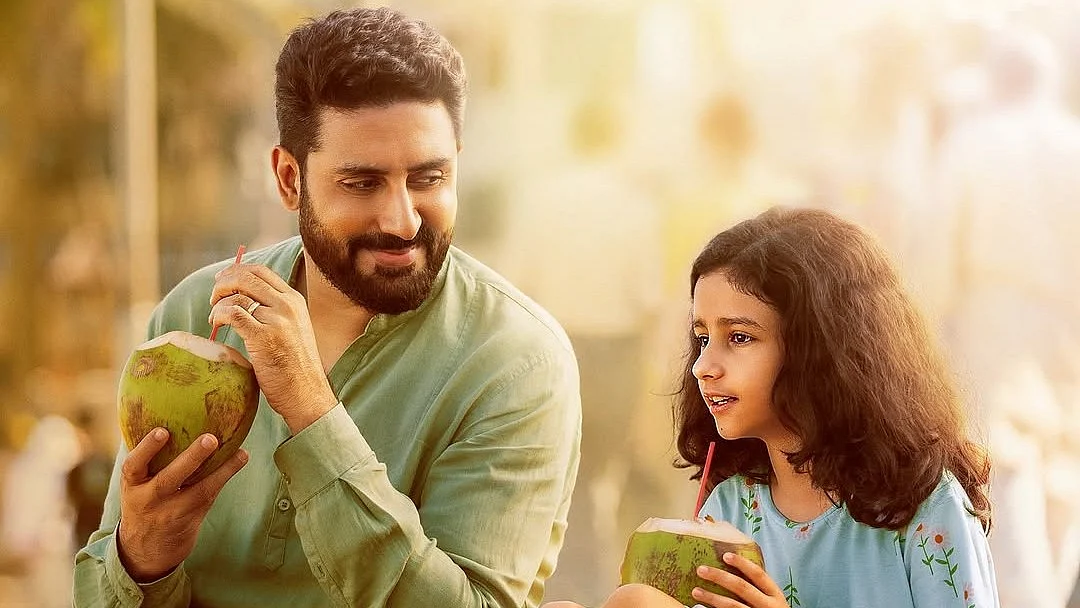'Be Happy' Review: Abhishek Bachchan, Inayat Verma Dance Drama Misses the Beat
'Be Happy' is streaming on Amazon Prime Video.

advertisement
When a film is titled ‘Be Happy’ you can almost see the plot unravel before your eyes before you even click ‘play’. Will the characters ‘be happy’? Everything we know about Indian cinema points to ‘probably not’.
Dhara (Inayat Verma) impresses a professional dancer Maggie (Nora Fatehi) which earns her a ticket to her dance program – the first step in her own dream of becoming a dance superstar. If it wasn’t obvious that it’s her dream, the background score makes sure you know. The only person standing in her way is her khadoos father Shiv (Abhishek Bachchan).
It’s not a new story but it’s still an interesting premise – the father-daughter duo trying their best to be ‘friends’ while dealing with the grief of losing a family member is a Bollywood staple at this point. There’s enough of a story to tell in that premise alone. Shiv, as a single father, tries to find the balance between granting his daughter’s wishes and discipline, especially with his father (Nassar) spoiling his daughter.
Dhara, on the other hand, has spent enough of her childhood grieving the loss of her mother and lives & breathes dance. Her dream is right within reach but it’s easier said than done.
Employing all the tricks up their sleeve – a la Simran trying to convince her father in Dilwale Dulhania Le Jayenge – Nassar and Dhara try to break Shiv’s walls down. It all culminates in one heartfelt discussion about grief and ‘moving on’. ‘Grief’ as an emotion is reduced to a shared emotion with a timeline the entire family must have naturally followed. The sensitivity with which films like The Mehta Boys or Goldfish handled the permanence of grief and its impact on those left behind after one’s passing is diluted here.
The shift from Ooty to Mumbai has sparks of a livelier film – adjusting to the big city comes with its frustrations and disappointment. We finally get a well-deserved glimpse into the toll the pursuit of her dreams is taking on Dhara. She isn’t simply a dancer – she’s a young girl entering the backstage of the glamorous world of showbiz. For her, the dream of becoming a dancer is limited to the spotlight and her name on a trophy.
Inayat is the embodiment of that spotlight in Be Happy – she shines on screen, even in the weakest scenes – which, in turn, complements Bachchan’s performance. His brooding, sour-faced persona acts as the perfect contrast – it’s a pity that he doesn’t get to dig deeper into the character.
That’s partly why the film mostly works when the camera is trained on the two of them, especially when it’s capturing the way Shiv watches Dhara bloom into a more uninhibited version of her.
But director Remo Dsouza never lingers on the deeper themes – shifting from one dance performance to another (some are quite impressive, others exist in the gaps between reaction shots). It’s all too quick and blurs together to become an extended reality show episode instead of the evocative human story it could be.
In Be Happy, the story seems to exist in the superficial & direct implications of everything. For instance, when Dhara’s health crisis becomes the crux of the movie, the story becomes about its implications on her dreams and how the community around her bands together to support her. Adorable but the film skates over a lot else – was Dhara pushing herself too far? How does her family deal with the guilt of not being able to catch the telltale symptoms?
Instead of answering these simple narrative questions, the film just flips the script on the two men in Dhara’s family. When one is strict, the other is accommodating.
It’s Inayat and Bachchan’s easygoing chemistry and Nassar’s dependable presence that elevates the film above the script. Could Be Happy have been a worse film? Most definitely, yes. It could’ve also been much better.
It’s not the dullest tool in the metaphorical OTT shed but it just doesn’t do enough to merit praise that goes much above that.